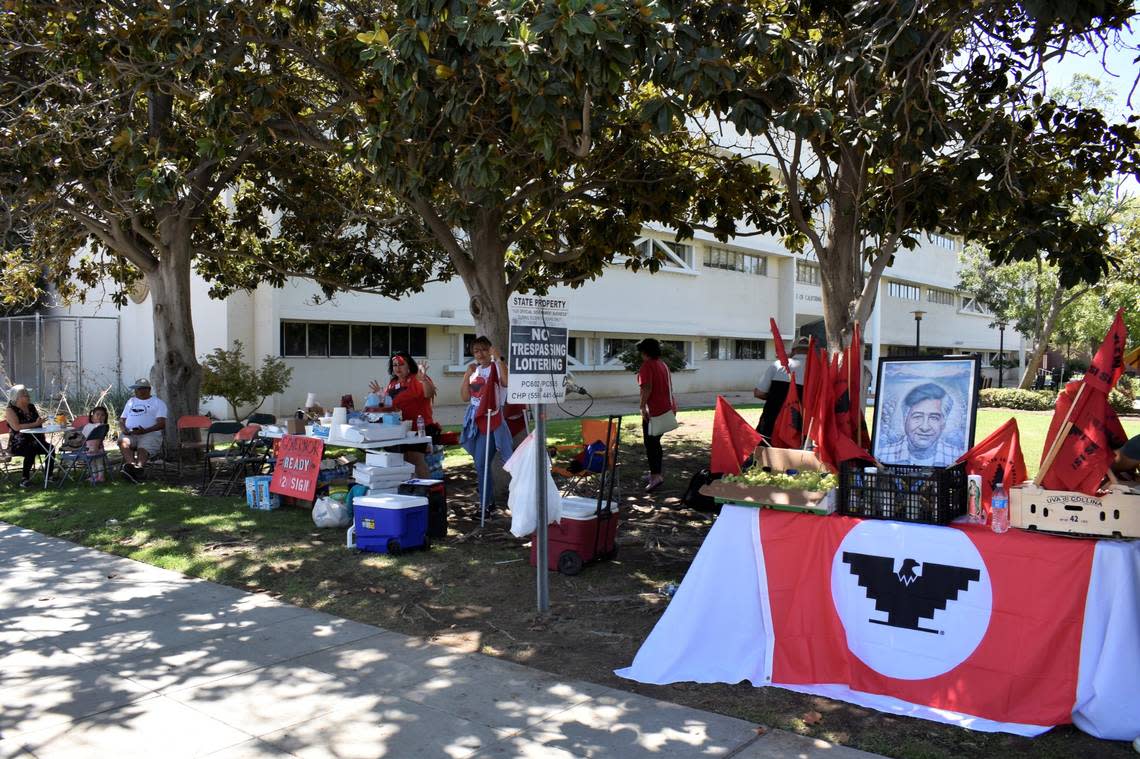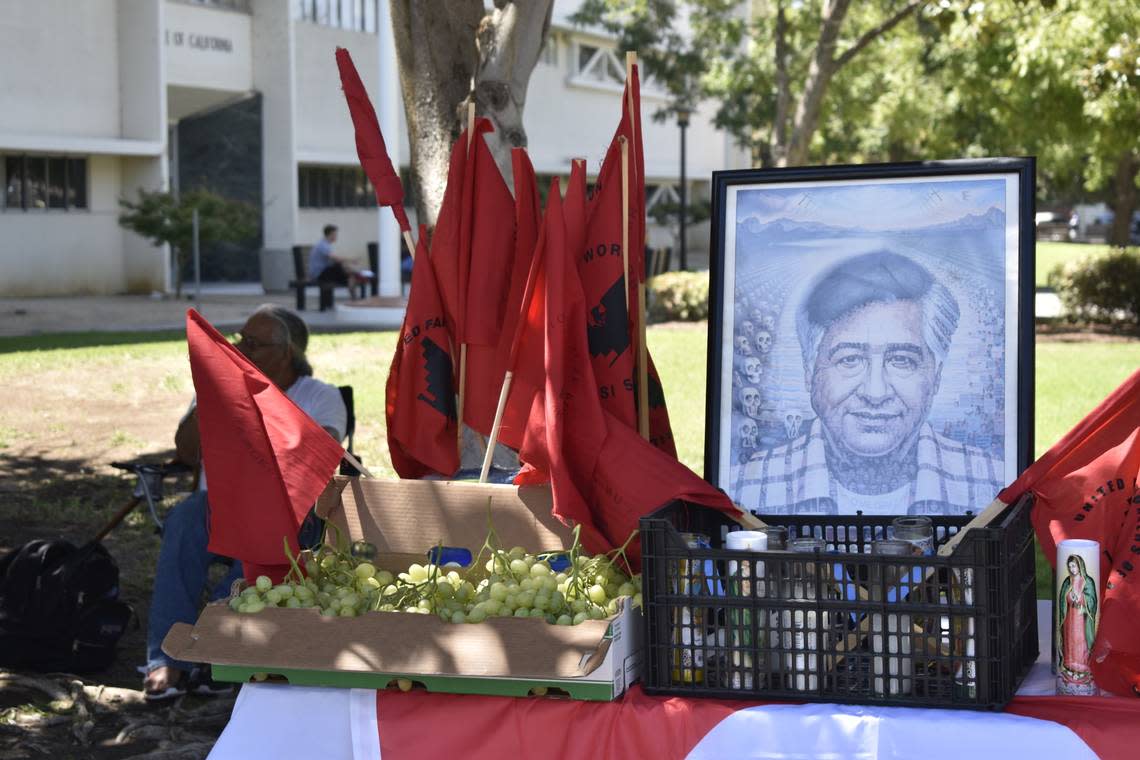Frustrated with Gavin Newsom, California farmworkers hold vigil in Fresno for union bill
Angel Noriega walked more than 150 miles alongside the United Farm Workers earlier this month to pressure Gov. Gavin Newsom to sign a bill that would give laborers more ways to participate in union elections. By the end of the trek, his feet were blistered and his ankles were swollen up to his calves.
“My feet were destroyed,” Noriega said in Spanish.
Despite the pain in his feet and legs, Noriega is continuing to fight for Assembly Bill 2183, the UFW-backed measure that would allow farmworkers to vote by mail in union elections. With a cane in hand, he was one of the 15 people who gathered for a vigil outside the Hugh Burns State Building in downtown Fresno on Tuesday.
The vigil in Fresno, and similar events in Sacramento, San Francisco and Los Angeles, are the union’s latest effort to urge Newsom to sign the bill. Protesters began gathering outside state government offices beginning Monday and intend to remain there until the governor signs the bill, according to Camila Rivera, political organizer with the UFW.
The gatherings follow the UFW’s nearly month-long, 335-mile “March for the Governor’s Signature,” which ended Friday in Sacramento. By the time the marchers had reached the state Capitol, Newsom’s office had announced that he would not sign the bill in its current form but remained open to negotiations.
The governor vetoed similar legislation last year, citing “various inconsistencies and procedural issues related to the collection and review of ballot cards.” The UFW responded by protesting at a winery Newsom owns and at the French Laundry, the Napa County restaurant where Newsom attended a lobbyist’s birthday at a time in the coronavirus pandemic when he was asking Californians to stay away from large groups.

This year’s legislation has faced staunch opposition from the agricultural industry and grower associations and widespread support among labor groups.
It passed out of the state legislature Monday and is now headed to Newsom’s desk. He has until the end of September to sign or reject the bill.
UFW supporters protest for voting rights bill
Noriega moved from the Mexican state of Guanajuato to the Central Valley more than 30 years ago. He’s harvested and pressed cotton in Tranquillity, and said he experienced the tough labor and conditions farmworkers face.
“Because of that, I support farmworkers,” he said.
By 1994, Noriega was working with Radio Campesina, the radio station founded by Cesar Chavez, and was the official field reporter for the station during the march that year, he said. He said he remains a devoted UFW volunteer because movements sometimes don’t resolve issues overnight, he said.
He said he supports the bill because he believes it’ll not only give farmworkers more flexibility to vote from home, but also reduce intimidation and confrontation at voting sites.
The law, he said, “would give farmworkers the rights that they truly deserve, because they are the ones that bring food to our tables and should be treated with respect.”
But the fate of the bill is uncertain.
“We know that the governor doesn’t completely agree with how we’ve implemented it, but if we don’t implement with what’s been written, then the farmworkers are really not going to be able to take the vote the way that they feel they need to take that vote,” said Stone, at Monday’s Assembly hearing.
Sen. Maria Elena Durazo, D-Los Angeles said the bill is “90%” of what the governor asked for.
“This bill, in this form, gives farmworkers a chance to fix a system that has not worked for a long time,” Durazo said.
Democratic lawmakers and Newsom remain at odds over Newsom’s request that the bill include a requirement for employers to receive an advance notice of the specific date of a union election.
“There’s a national standard for how these mail-in elections are run,” Anthony York, spokesperson for the governor’s office, said on a phone call with The Bee on Friday morning. “Thousands of workers have been using them (those standards) to unionize and we believe that should be the standard.”
UFW leaders point out this “standard,” taken from National Labor Relations Act model, does not work for farmworkers, given their history with threats of intimidation and deportation.
Opponents argue the bill will lead to forced unionization in the agriculture industry, and is a transparent attempt by UFW to increase its membership. Today, the union has about 6,000 members, down from an estimated 70,000 in the 1970s.
La Abeja, a newsletter written for and by California Latinos
Sign up here to receive our weekly newsletter centered around Latino issues in California.
Vigil continues as UFW awaits Newsom’s decision
As part of the Fresno vigil, Noriega and four other supporters camped outside the state offices on Monday night. Noriega brought his own electric generator so he and others who spent the night by the state offices could light up their camp spot.
At noon Tuesday, the group grew to 15 people. They took turns waving UFW flags and holding up posters that read, “Gov. Newsom, do not ignore us!” Others sat in the shade and enjoyed the donated supplies: bottled water, coffee, freshly baked pan dulce, recently picked grapes and home-cooked pozole.

The mood was positive and supporters encouraged each other.
Rivera, the UFW political organizer, recognized that the vigils are happening during the weekdays and supporters who work can’t protest along with the groups outside state government offices. Yet, she said she is thankful for the community’s support on social media and through donations.
“We’re hoping he makes a decision. If not, then we’re going to have to be out here until the end of September,” Rivera said. “We’re not going to stop until farmworkers have the right to vote for the union election from the safety and comfort of their homes.”
